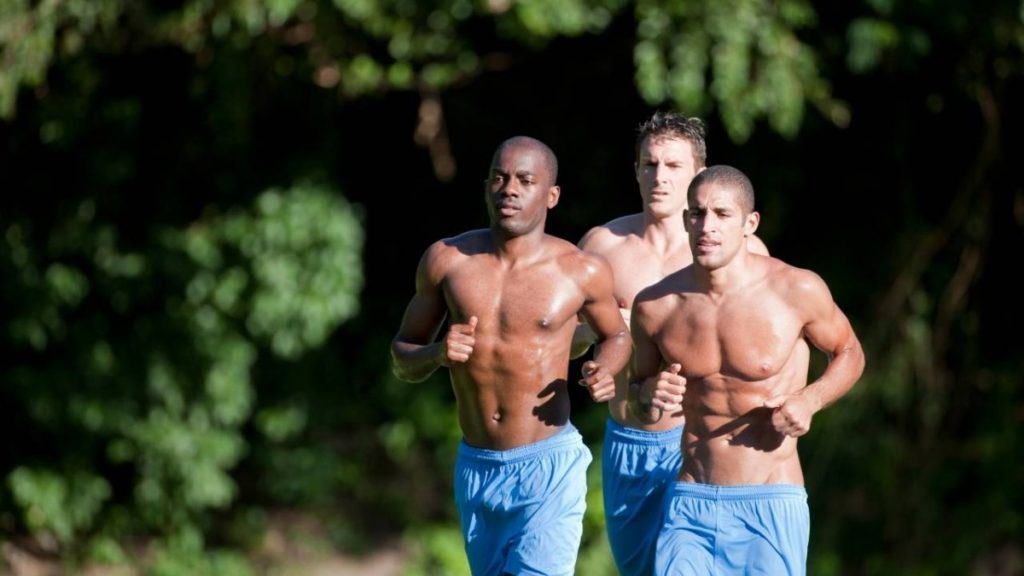Is your 8km distance good? How many calories are you actually burning per km? How can you improve the distance that you are running? We are going to attempt to answer every single one of your questions on this page. In just 10-15 minutes, you will know all about 8km distance running.
On average, you can expect most beginners to run 8km in a time of between 45 minutes and 1 hour 10 minutes. For more advanced runners you can estimate a time of 35 minutes. For professional runner its a time of 30 minutes.
Table of Contents
Average 8km Running Time for Females

On average it takes a female between 55.30 and 69.44 to run 8km. It depends on their age, weight and overall fitness levels. For instance a female that is aged between 30-34 can expect a 8km running time of 56 minutes. For a female that is aged 45-50 can expect around 60.00 minutes.
| Average Time to Run 8 km For Females | ||||||
| Age | Beginners | Intermediate | Advanced | |||
| 15-20 | 00:58:40 | 00:40:08 | 00:32:40 | |||
| 20-25 | 00:59:20 | 00:36:40 | 00:32:00 | |||
| 25-30 | 00:59:28 | 00:37:04 | 00:32:32 | |||
| 30-35 | 00:59:44 | 00:37:36 | 00:33:04 | |||
| 35-40 | 01:00:56 | 00:38:56 | 00:33:52 | |||
| 40-45 | 01:01:36 | 00:39:52 | 00:35:36 | |||
| 45-50 | 01:01:52 | 00:40:24 | 00:36:40 | |||
| 50-55 | 01:02:00 | 00:41:44 | 00:37:28 | |||
| 55-60 | 01:08:16 | 00:44:40 | 00:39:20 | |||
| 60-65 | 01:12:16 | 00:48:08 | 00:40:24 | |||

Average 8km Running Time for Males
On average it takes a male between 45.04 and 59.04 to run 8km. It depends on their age, weight and overall fitness levels. For instance a male that is aged between 25-29 can expect a 8km running time of 48 minutes. For a male that is aged 40-44 can expect around 51 minutes.
| Average Time to Run 8 km For Males | ||||||
| Age | Beginners | Intermediate | Advanced | |||
| 15-20 | 00:48:08 | 00:32:08 | 00:27:12 | |||
| 20-25 | 00:47:20 | 00:33:36 | 00:26:32 | |||
| 25-30 | 00:47:44 | 00:31:28 | 00:27:12 | |||
| 30-35 | 00:48:08 | 00:31:44 | 00:27:28 | |||
| 35-40 | 00:48:40 | 00:31:52 | 00:28:08 | |||
| 40-45 | 00:52:16 | 00:34:08 | 00:30:24 | |||
| 45-50 | 00:54:08 | 00:34:56 | 00:31:20 | |||
| 50-55 | 00:56:40 | 00:39:20 | 00:32:32 | |||
| 55-60 | 00:59:12 | 00:41:04 | 00:36:40 | |||
| 60-65 | 01:04:24 | 00:43:36 | 00:38:56 | |||
These are the average times for those who are running 8km fairly regularly. If you are a new runner, you probably shouldn’t expect to hit these times, at least not until you have been running 8km consistently for several months and, even then, it is likely still going to be a push.
For these times, we are running under the assumption that the average time to run a km is between 5 and 6 minutes for an intermediate runner. Although, of course, there are several factors that could have an impact on how fast people run.
This means that you shouldn’t fret too much if you are struggling to be able to reach these times. While it is ideal to get as close to them as possible, you should run for fun rather than to ensure that you are running at blazingly fast speeds all the time.
Check out my big running data analytics that contains every running distance by age and gender in a full comparison table for beginners and intermediates. You can compare your average running times against every distance in your age and ability group.
Other Running Distance You Might Find Helpful

How Many Calories Will You Burn Running 8km?
On average, if you run 8km at a 8 minute pre kilometre pace at a speed of 9.6kmph you can expect to burn around 700 calories. The number of calories you burn running 8km will depend on your weight, gender and pace. A person who weighs 200 pounds and runs 8km in 50 minutes will burn about 632 calories. A person who weighs 170 pounds and runs 8km in 50 minutes will burn about 528 calories.
| Weight | Calories Burned For 8km |
| 160lbs | 504 calories |
| 170lbs | 528 calories |
| 180lbs | 568 calories |
| 190lbs | 592 calories |
| 200lbs | 632 calories |
| 210lbs | 656 calories |
| 220lbs | 688 calories |
| 230lbs | 728 calories |
| 240lbs | 94 calories |
| 250lbs | 99 calories |
Do bear in mind that there isn’t really a true ‘average’ calories burned. People are likely to be burning calories at different rates. This is because the following can impact calories burned:
- How fast you are running
- Your metabolism
- Your weight
- Your height
- The conditions that you are running in (uphill will burn more calories than downhill running)
- Your gender.
We have tried to estimate the calories burned down the lower end of the spectrum. There is a pretty good chance that you are burning significantly more calories per km. However, unless you are able to get your hands on some pretty extensive testing equipment, it is going to be impossible to know for sure.

Should You Run 8km Every Single Day?
While we know that there are plenty of people out there that don’t really have any huge issues with running 8km every single day, we are firm advocates of the idea that the body should be taking regular breaks.
If you are routinely able to hit 8km in a single run, we suggest that you give yourself a day or two off per week. Give your body time to recover. Not only will you find that this helps to prevent injuries but if your body is allowed to recover, your muscles will get a little bit stronger.
On your rest days, you may want to run just a couple of km. Just to keep you in the swing of things. Although, we are certainly the type of people that just loves to have blanket rest days. It works so much better.
What’s the best investment you could make in your running performance? To discover the exact running gear and why it has significantly improved my running, read this post.

Tips For Improving Running Distance
If you are looking to increase the distances that you can run, we suggest that you follow these tips. These tips are going to be useful not only for those that are planning on hitting an 8km run in the near future but for those that want to push themselves beyond the 8km.
1. Build Your Distance Up Gradually
Don’t jump in at the deep end. That’s how you end up getting nowhere close to your distance. Gradually build your distance up. Add 100m-200m to your running every week. This should give you an extra 1km every month and a bit.
We have seen people attempt to jump from something like 4km to 8km, and they haven’t quite built up the endurance that allows them to get there.
2. Run a Bit Slower
In the early days of attempting a new distance, you shouldn’t be aiming to smash running records. You should be aiming for a much more leisurely pace. This way, you can find out how your body will cope with the longer distances.
As we said before, the average intermediate runner will likely clear a kilometer every 6-minutes or so. Don’t be afraid to bump this up to 8-9-minutes per km. Once you hit your target distance consistently, then you can start to speed yourself up a little bit.
3. Hydrate Yourself
A lot of people forget to hydrate themselves. It baffles us. Hydration is vital for keeping your muscles working. Your muscles are important for running. You should be drinking at least 1 liter of water for every hour that you run. You don’t need to drink much more than this, even if you feel tempted. The body can’t process water faster than this.
4. Get Better Running Equipment
Want the best way to make running a lot more comfortable for you? Invest in a quality pair of running shoes. It will work wonders. Running shoes are much more comfortable. They will provide better support for your feet and legs. This means that you are less prone to get tired if you are running longer distances.
8 km Average Run Time Summary
Most people can expect to run a km in 5-8 minutes, depending on age and gender. So, if you are an intermediate runner, you could easily run this distance in 40 to 64 minutes. Don’t worry too much about speed if this is your first time tackling a distance, though. Focus on getting to that end line without stopping, no matter how slowly you run.



